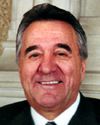Mr. Speaker, the risk of foot and mouth disease entering and gaining a foothold in our country has many farmers and their families losing sleep at night.
An article in the Edmonton newspaper quoting a lead veterinarian with the Canadian Food Inspection Agency has me worried. To quote Larry Delver, the veterinary program officer with the CFIA, he said:
We are at risk. We don't have sniffing dogs at the Edmonton or Calgary airports and we can't go through a traveller's luggage unless we are suspicious...Once people go through the foot baths at the airports they are gone. We just have to trust them.
This is not a time for partisan politics. All members of the House and all levels of government need to put every ounce of effort into protecting our borders from this outbreak.
If the government is so dedicated to Canadian farmers and, for that matter, our economic prosperity, then how does it justify only six dogs, minimal baggage inspection and flat out failure to inspect people and baggage coming here from areas infected with foot and mouth?
We should not be needlessly ringing alarm bells, but we are talking about a $20 billion industry that needs protection. Why has the government not put in place a plan to better handle this issue?















